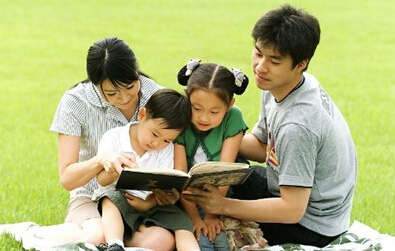(单词翻译:单击)
Investment on children, especially their education, ranks atop a list of priority items that a typical Shanghai family is most willing to pay for, a survey has found.
据某调查发现,一个典型的上海家庭最愿意对孩子投资,尤其是对孩子教育的投资排在投资清单的最前面。
Nearly 40 items made the list that covers the needs of people at different stages of their life, ranging from getting married to bearing and raising a child to caring for the elderly. Of them, the top six are all related to children, according to the poll conducted by the Family Development Research Center of Fudan University.
一个由复旦大学家庭发展研究中心发起的民意调查结果这样显示:这项投资清单由40个项目组成,涵盖了人们在一生不同阶段的需求,从结婚到生子,养育孩子,到照顾长辈。所有这些项目中,排在前六的都与孩子有关。
Cultivating a child's hobbies is ranked at the top of the list, with tutoring coming in second and early childhood education taking third place, according to the survey, which polled nearly 2,300 households in Shanghai.
根据对上海将近2300个家庭的调查结果统计,培养孩子的兴趣爱好排在清单的第一位,作业辅导紧随其后,早教排在第三位。

While a couple usually would be willing to pay excessively for the benefit of their children, they often set aside their own needs, said Shen Yifei, director of the research center, adding that many couples also have to take care of elderly family members.
研究中心的主管沈一飞说,父母通常愿意为孩子的发展过度开支,同时他们往往忽略了自身的需求,许多夫妇还必须得照顾家里年迈的长辈。
Shanghai is the country's first major city to face an aging society, with the number of its residents age 60 and above currently at 4.14 million - or nearly 30 percent of its population, compared with 15.5 percent nationally.
上海是中国第一个面临人口老龄化问题的城市,目前的常住居民中60岁及以上的人有414万,几乎占到上海市人口的30%,而全国的60岁及以上人口比例为15.5%。
The survey findings could be applied to other parts of the country to help them solve similar problems, such as a rapidly aging society, said Zhu Meihua, a professor at the department of social work at East China University of Science and Technology.
华东理工大学社会工作学院的朱美华教授表示,调查结果将会运用到其它的地区,帮助他们解决相似的问题,比如社会老龄化加快等等。
Experts said it's understandable that many Shanghai families are willing to spend more on their children, because of the city's low fertility rate.
专家称鉴于当前上海的低生育率,很多上海家庭更愿意为孩子支出是可以理解的。
"The current fertility rate is 0.79 in Shanghai, one of the lowest in the world. That is why a child's needs always come first," said Hu Zhan, an associate professor at the School of Social Development and Public Policy of Fudan University.
复旦大学社会发展与公共政策学院副教授胡占说:“上海市现在的生育率是0.79,是世界最低水平之一,这就是为什么父母总是把小孩的需求排在第一位。”
Zhu said, "Chinese people's deep-rooted belief that a child bears the future of the family often makes the child the focus of the family's financial support."
朱教授称,“中国人有着根深蒂固的观念,认为孩子是家庭的希望,所以家庭的财政开支总愿意花在孩子身上。”
However, Hu said a couple should care for their children rationally, not at the cost of their own career prospects or relationship, which Hu said is the cornerstone of society.
然而,胡教授说,父母应该理性的去关心孩子,不应以牺牲自己的职业发展前景或双方关系为代价。这些才是社会发展的基石。
"There are many examples of mothers quitting jobs to take care of their children around the clock. It's like gambling," he said.
“现在确实出现很多妈妈辞职,全天候的去照顾孩子的例子,这就像是一场赌博。”胡教授说。


